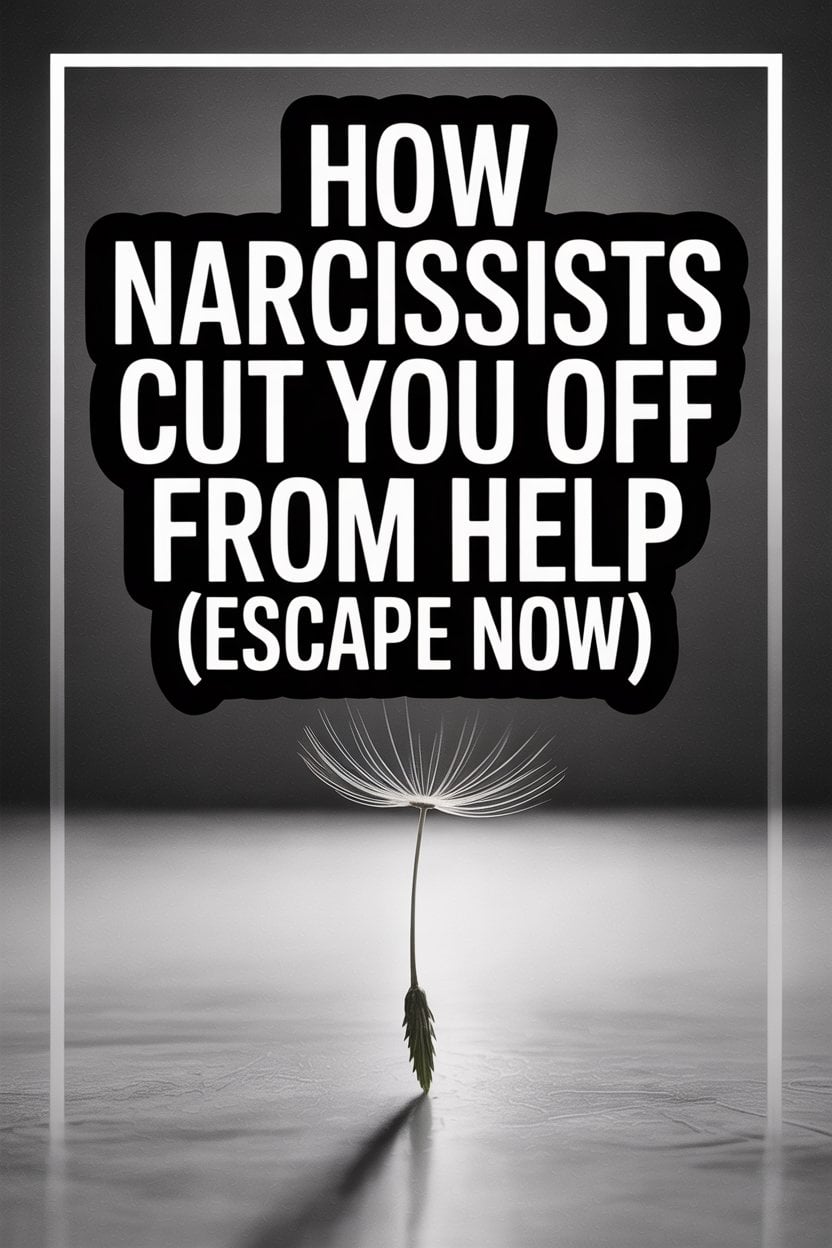Living with a narcissist can feel a bit like starring in your own true crime docuseries, except the villain is always close by, hogging the remote.
If you’ve ever noticed your circle of friends shrinking or found yourself questioning reality more often than your morning coffee, you might already be tangled in one of the narcissist’s favorite power plays: isolation.
This is no accident. Narcissists are masters at cutting off your lifelines, leaving you feeling alone and confused—easier to control, easier to manipulate, and significantly less likely to call in reinforcements.
Ready to untangle the web? Let’s shine a light on how these isolation tactics work, why they’re so effective, and—most importantly—how to bust through those walls and find your way out.
The Isolation Game Plan
Narcissists don’t just wake up one day and announce, “Today, I shall isolate my partner!” (Though, if they did, at least things would be more straightforward.) No, this happens in slow, sneaky steps.
One day your social calendar is full, and the next, you’re ghosting group chats and dodging calls from your mum.
This insidious process usually starts with seemingly innocent observations: “Your friend doesn’t really understand you.” Or, “Your family seems a bit jealous of us.”
Before you know it, you’re second-guessing every relationship you had before the narcissist strolled in with their charm and that suspiciously perfect hair.
Turning Friends and Family Into Foes
Narcissists thrive on being the star of your show, and supporting characters can’t be stealing the spotlight.
They’ll plant seeds of doubt about your loved ones: “I just don’t think they support our relationship.” Or the classic, “They’re so negative—don’t let them pull you down.”
Soon you’re looking at your best mate or your sister through the narcissist’s lens, convinced they’re out to sabotage your happiness. The result? You pull away, just as planned.
And if subtlety doesn’t work, they’ll up the ante—picking fights with your friends, embarrassing you at family gatherings, or outright forbidding you to see certain people.
Suddenly, it’s easier to stay home than deal with the drama.
The Guilt Trip Express
Ever tried to see a friend only to be met with a guilt trip worthy of a BAFTA? “I just thought we were going to spend the weekend together, but if you’d rather see them…” Or the old chestnut: “I guess I’m just not as important to you.”
It’s emotional blackmail, plain and simple. And it works, especially when you just want peace and quiet, not to mention avoiding the emotional hangover that follows their sulking sessions.
After a while, you stop making plans, because it’s less hassle.
Rewriting Your Reality
Isolation isn’t just about physical separation. Mental and emotional distance work just as well, if not better.
Narcissists are skilled at gaslighting, a tactic designed to make you question your own reality. They’ll twist events, deny things they said (even when you’re positive you heard them), and convince you that your memory is faulty.
When you start doubting your own mind, who are you going to trust? Certainly not yourself—and certainly not those “outsiders” the narcissist has warned you about.
Playing the Victim
A narcissist’s favorite pastime: turning themselves into the martyr. If you try to spend time with others or seek support, suddenly you’re “hurting” them.
They might even go on a campaign to tell mutual friends or family members how you’ve abandoned them or treated them cruelly.
Now, not only are you isolated, but you’re also defending your character against a PR smear campaign you never signed up for.
Keeping Tabs and Creating Drama
Ever noticed your partner’s uncanny ability to know when you so much as glance at your phone? Narcissists can be obsessively controlling—they want to know who you’re talking to, what you’re saying, even when you’ll be back from the shops (down to the minute).
And if you manage to spend time with others, there’s bound to be a fallout: accusations, interrogations, suspicion. All designed to make the whole thing seem not worth the bother.
Financial Ties That Bind
Isolation isn’t always emotional or social—sometimes it’s as simple as making sure you’re not financially able to leave.
Narcissists often maneuver themselves into a position where they control the money: your access to bank accounts, your job status, even your phone plan.
With no cash and no privacy, you’re left relying on them for everything. The old saying “money talks” takes on a creepy new meaning.
Cutting Off Professional Help
One of the fastest ways to recovery is therapy or counseling—but narcissists know this, and they’re not about to let a professional see behind the curtain.
They’ll belittle therapy, mock the idea of “airing dirty laundry,” or accuse you of being disloyal for wanting outside help.
If you manage to set up an appointment, expect sabotage: sudden emergencies, relentless texting during your session, or “forgetting” to give you a lift.
Encouraging Self-Doubt
Not content with alienating your support network, narcissists will have you doubting your worth, sanity, and ability to survive on your own. They’ll highlight your “flaws,” exaggerate your mistakes, and remind you of every time you fell short.
The message is clear: you can’t do it alone.
This is a lie. But after being drip-fed this narrative for long enough, it starts to feel like the truth.
The Subtle Art of Sabotage
Sometimes the isolation tactics are overt—sometimes they’re sneakier than a cat in a birds-only pet shop. Maybe your texts “aren’t going through,” or your invitations “accidentally” get lost.
A narcissist may forget to give you messages or tell you people “didn’t want to see you.” Over time, your social world shrinks, but the excuses always seem so plausible.
Why Isolation Works So Well
The narcissist’s endgame is control, and isolation removes your ability to call in reinforcements. Without outside perspectives, their version of reality becomes yours.
The less support you have, the harder it is to see the abuse for what it is—and the easier it is for them to maintain power.
If you’re feeling alone, exhausted, and unsure where your old self went, it’s not a reflection of your worth—it’s the result of a calculated campaign.
Now, what can you do about it?
Spotting the Red Flags
Getting out starts with recognizing what’s happening. If you notice patterns like guilt-tripping, increased secrecy, or sudden friction between you and your loved ones, don’t write it off as “just a rough patch.”
Ask yourself: Are you seeing friends and family less often? Are you keeping secrets about your partner’s behavior? Do you feel anxious about making plans without their approval?
That’s not “relationship ups and downs”—that’s intentional isolation.
Rebuilding Your Lifelines
Escaping the narcissist’s web takes guts, but it’s far from impossible. Start reconnecting with friends or family you trust, even if it’s just a message to say hi.
Don’t be embarrassed if you’ve been distant; real friends understand more than you think. “Sorry I’ve been MIA—things got a bit much.” Leave it at that, if you want. No explanation necessary.
If you’re worried about privacy or retaliation, consider setting up a new email or social media account, or use encrypted messaging apps. Small steps count.
Seek Professional Support—Strategically
Therapists and counselors see through narcissistic tactics every day. If your partner makes therapy impossible, look for online support, helplines, or counseling apps that let you chat anonymously or outside the house.
If you’re in immediate danger, reach out to a domestic abuse hotline or local support service, even if you’re not “sure” it counts as abuse. Spoiler: emotional and psychological isolation is abuse.
Strengthening Your Confidence
Every time you reach out, share your feelings, or stand up for yourself—even in tiny ways—you chip away at the power the narcissist holds over you.
Write down moments when you doubted yourself and what actually happened. Journaling can clarify patterns and help you see just how much of their narrative is pure fiction.
And if you catch yourself apologizing for things you didn’t do, catch it, call it out (even just to yourself), and remind yourself that your needs are valid.
Planning Your Exit
If the relationship has moved into outright control, isolation, or abuse, planning your next steps carefully is key. Talk to a trusted friend or counselor before making any big moves.
Keep important documents, some cash, and essentials in an easily accessible spot, just in case.
And don’t buy into the myth that you’re “overreacting” or “too sensitive.” Those are just more tricks to keep you quiet.
Reclaiming Your Support Network
Breaking free from a narcissist’s isolation games feels a bit like coming out into sunlight after months indoors—blinding, but exhilarating.
Rebuilding your support system might take time, but every conversation, every shared laugh, every honest chat is another thread in your safety net.
True friends aren’t fazed by gaps or awkwardness—they’re just glad you’re back. Family can surprise you.
And if your old network isn’t available, new connections are out there—support groups, online communities, even that chatty neighbor you’ve been avoiding.
Taking Back Control
Isolation is the narcissist’s weapon, but it doesn’t have to be a life sentence. Recognize the patterns, reach out for help, and step back into your own life—one where you get to decide who’s on your team.
Escape isn’t about grand gestures, but small acts of reclamation.
A text. A coffee out. A private thought: I deserve better.
Because you do. And you’re not alone, no matter how hard someone’s tried to convince you otherwise.


